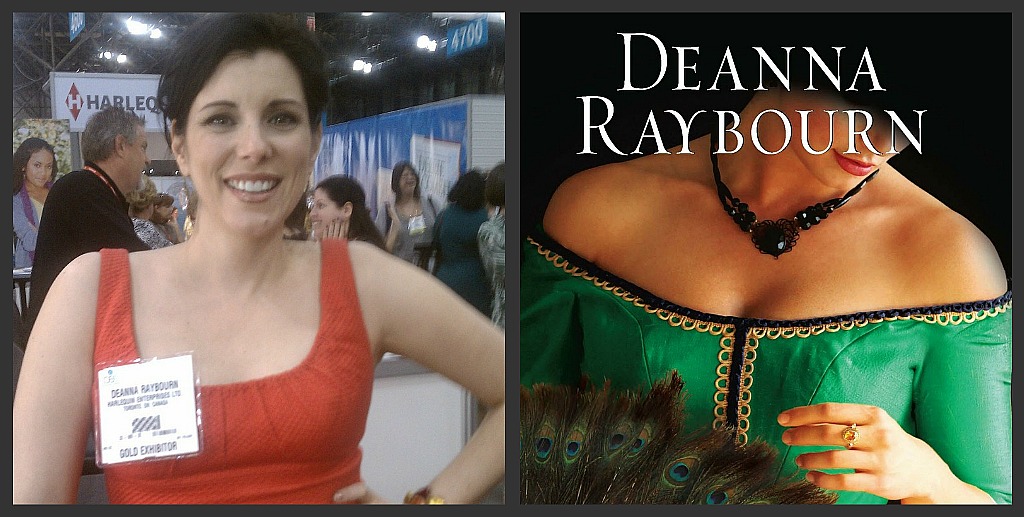Deanna Raybourn, author of the New York Times bestselling Lady Julia Grey mysteries, was kind enough to let me tow her to a slightly less cacophonous corner of the Harlequin booth (at BEA 2011) for a quick interview on all things Lady Julia.
Byrt: Can you talk a little bit about your series, and tell people what it’s about?
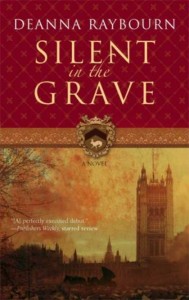 Deanna: Sure. The Lady Julia Grey series is a late Victorian series that crosses genres – it’s historical fiction that has been nominated for romance awards and mystery awards. And I tend to get readers from both sides – I’m cross pollinating, with other writers like Tasha Alexander and Lauren Willing. It’s a mixture of genres that I love to write, because it’s what I love to read – and that’s how I got started writing these books. It’s kind of an amalgamation of all the things that I love best – I love Jane Austen and I love the Brontes, but I also love Agatha Christie mysteries, and so this was a way to kind of combine everything together, and it’s a lot of fun.
Deanna: Sure. The Lady Julia Grey series is a late Victorian series that crosses genres – it’s historical fiction that has been nominated for romance awards and mystery awards. And I tend to get readers from both sides – I’m cross pollinating, with other writers like Tasha Alexander and Lauren Willing. It’s a mixture of genres that I love to write, because it’s what I love to read – and that’s how I got started writing these books. It’s kind of an amalgamation of all the things that I love best – I love Jane Austen and I love the Brontes, but I also love Agatha Christie mysteries, and so this was a way to kind of combine everything together, and it’s a lot of fun.
Byrt: As an American writing British, you have a secret weapon in that you’re descended from an ex-pat. Can you talk a little bit about how much your family influences your stories?
Deanna: Well my Grandmother is English and my father is a first generation American. So I grew up with a really strong English influence. I read a lot of English books, I watched a lot of English television programs (when I could – they were a little harder to get in 70’s when I was a small child), and I kind of absorbed that British sensibility. I ‘ve got a very British sense of humor (and I watch a lot of BBC America, I’ll admit). There’s something about the British sense of humor that is understated and sly and not over the top that I really appreciate, and so I try to put that into my books. Again, I write what I like to read, and I think that’s the best way to be successful.
Byrt: Talk to me a little bit about the research you do – what do you have to do to put together a mystery? In terms of the setting, in terms of the period detail – how do you go about it?
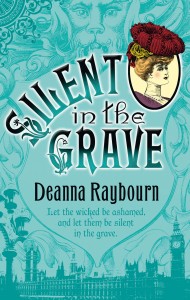 Deanna: Putting together a mystery is actually one of the easier things that I do, because the structure is very simple – you start off with a problem, and it’s, okay, if I move from point A to point B, then I may have to know fact C before I can get there, and so it’s very easy to structure that part. The harder part is creating worlds where I’ve never been. You know, I’ve never been to 1880’s London; I’ve never been to Darjeeling; I’ve never been to- well, I have been to Yorkshire. I wrote a book set in Yorkshire, and usually I do a lot of armchair travel, but in that case I told my husband: “I need to smell a moor.” And so we packed the bags and went to Yorkshire and we wandered around in Bronte country for a week – and it was great, because I learned things that I never would have known about moors if I hadn’t stood on one (i.e. you can’t hold a conversation on a moor – they’re too windy, it’s really loud). It added a lot to the book – the setting of my books are always a separate character, and it really supports the action a lot. I try very hard to give the characters a sense of what it’s like to be there – I do a ton of armchair research, I read everything. I start off with – this sounds crazy, but I read children’s non-fiction books, because they give you a really good general overview. Then I read letters, and diaries, and memoirs; I read lots of biographies. And my secret weapon (that I don’t really talk about very often): I found out a while back that if you can find a writer who grew up in an area and wrote a memoir about their childhood, they can usually describe a place better than anyone else; better than a travel writer, better than someone who has actually been there as an adult – as a child, they’ve absorbed it in a way that you just don’t do when you’re a grown up, and they describe it a different way. And so when I was writing about Darjeeling, I picked up books by M.M. Kaye and Rumer Godden, and read about their experiences as children there, and got a completely different perspective – and that was hugely helpful to me, because I was able to create this environment where I hadn’t been. Because I was really not going to pack my bags and head off to Darjeeling at the time…
Deanna: Putting together a mystery is actually one of the easier things that I do, because the structure is very simple – you start off with a problem, and it’s, okay, if I move from point A to point B, then I may have to know fact C before I can get there, and so it’s very easy to structure that part. The harder part is creating worlds where I’ve never been. You know, I’ve never been to 1880’s London; I’ve never been to Darjeeling; I’ve never been to- well, I have been to Yorkshire. I wrote a book set in Yorkshire, and usually I do a lot of armchair travel, but in that case I told my husband: “I need to smell a moor.” And so we packed the bags and went to Yorkshire and we wandered around in Bronte country for a week – and it was great, because I learned things that I never would have known about moors if I hadn’t stood on one (i.e. you can’t hold a conversation on a moor – they’re too windy, it’s really loud). It added a lot to the book – the setting of my books are always a separate character, and it really supports the action a lot. I try very hard to give the characters a sense of what it’s like to be there – I do a ton of armchair research, I read everything. I start off with – this sounds crazy, but I read children’s non-fiction books, because they give you a really good general overview. Then I read letters, and diaries, and memoirs; I read lots of biographies. And my secret weapon (that I don’t really talk about very often): I found out a while back that if you can find a writer who grew up in an area and wrote a memoir about their childhood, they can usually describe a place better than anyone else; better than a travel writer, better than someone who has actually been there as an adult – as a child, they’ve absorbed it in a way that you just don’t do when you’re a grown up, and they describe it a different way. And so when I was writing about Darjeeling, I picked up books by M.M. Kaye and Rumer Godden, and read about their experiences as children there, and got a completely different perspective – and that was hugely helpful to me, because I was able to create this environment where I hadn’t been. Because I was really not going to pack my bags and head off to Darjeeling at the time…
Byrt: You might have enjoyed it…
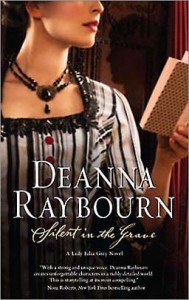 Deanna: Sometimes it’s too far, or there are too many shots… I want to write book set in Africa, and I think: yellow fever, no thank you. Sometimes it’s too expensive, or too far, or the place has changed too much, and it wouldn’t give you a sense of what you need, if you’re putting a historical book there – or for whatever reason, you’re not able to go. And so you have to do the best you can with what you have, and I think I’ve done pretty good at trying to find sources that aren’t maybe the most apparent places to look for information. And it’s been tremendously helpful.
Deanna: Sometimes it’s too far, or there are too many shots… I want to write book set in Africa, and I think: yellow fever, no thank you. Sometimes it’s too expensive, or too far, or the place has changed too much, and it wouldn’t give you a sense of what you need, if you’re putting a historical book there – or for whatever reason, you’re not able to go. And so you have to do the best you can with what you have, and I think I’ve done pretty good at trying to find sources that aren’t maybe the most apparent places to look for information. And it’s been tremendously helpful.
Byrt: Now in your latest book, you’re returning to London. Is it hard to approach the same city, again? Is it hard to find a new angle? You’re returning to the same house, the same setting…
Deanna: I was thrilled to go back to London. It’s the fifth book in the series, and it’s the first time I’ve been in London since the first book. I keep them out of London, after the first book – they’ve been in the British countryside, in two very different English settings; they’ve been in India – and so this is a great opportunity to get back to where they started in their relationship. And it was so much fun to be back in London, the foggy gaslit streets – it’s cliche, but it’s fabulous. It’s always so much fun for me – just when you think you know London, you turn another page, and it’s completely different, and that’s always fantastic. London is absolutely one of my favorite places in the world to write about – it’s a wonderful experience, always.
Byrt: Now with the evolution of your series, of Lady Julia, she’s becoming more and more an equal and a partner and an investigator in her own right. Does this book take the next step? Is she a full partner now?
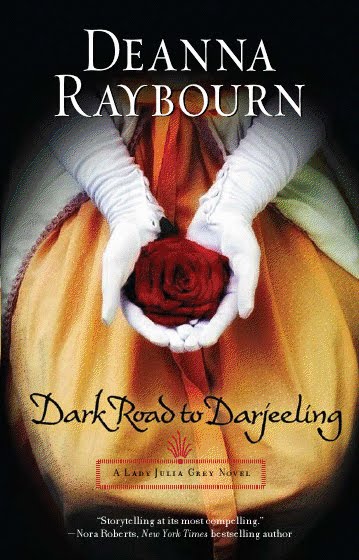 Deanna: She’s working on it, she really is. She’s seeing resistance from Nicholas, her husband and founder of the inquiry agency, but she’s always, always, always going to have that indomitable will, and that drive to prove herself. And she’s always going to push boundaries that he’s not comfortable with. This is the first book where we see them after their honeymoon, where they’re back home, and they’re trying to work things out and figure out, where do we go from here, how do we fit together on a day to day basis. We’ve done the big exotic trip – what’s it like, day in and day out together, how do we make this partnership work, and how do we find a balance between her adventuring and his need to protect. His epoch is to provide and protect, and hers is – she’s a Kipling mongoose, go and find out. That’s what she is. So there’s always going to be that dynamic between them, which is good because with a series, once you marry characters off, you have to keep the dynamic going. There has to be a sense tension – and the tension is not, do we like each other, are we going to have sex, are we going to get married. The tension is, are you going to let me be who I need to be. And that’s a question for both of them because Nicholas need to be the provider and protector; who Julia needs to be is the girl who is a very factualized – which is a very 1970’s word for a very 1880’s girl – she needs to have the feeling that she’s doing something worthwhile, that she’s accomplishing. And it’s a dance.
Deanna: She’s working on it, she really is. She’s seeing resistance from Nicholas, her husband and founder of the inquiry agency, but she’s always, always, always going to have that indomitable will, and that drive to prove herself. And she’s always going to push boundaries that he’s not comfortable with. This is the first book where we see them after their honeymoon, where they’re back home, and they’re trying to work things out and figure out, where do we go from here, how do we fit together on a day to day basis. We’ve done the big exotic trip – what’s it like, day in and day out together, how do we make this partnership work, and how do we find a balance between her adventuring and his need to protect. His epoch is to provide and protect, and hers is – she’s a Kipling mongoose, go and find out. That’s what she is. So there’s always going to be that dynamic between them, which is good because with a series, once you marry characters off, you have to keep the dynamic going. There has to be a sense tension – and the tension is not, do we like each other, are we going to have sex, are we going to get married. The tension is, are you going to let me be who I need to be. And that’s a question for both of them because Nicholas need to be the provider and protector; who Julia needs to be is the girl who is a very factualized – which is a very 1970’s word for a very 1880’s girl – she needs to have the feeling that she’s doing something worthwhile, that she’s accomplishing. And it’s a dance.
Byrt: I’ve thought since the first book, there’s a bit of a comedic turn to Lady Julia – do you ever almost want to take her in a little bit of a slapsticky direction, into that physical realm of humor? Because it seems like you’ve been on the verge a couple of times – when she’s gone undercover…
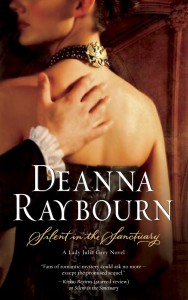 Deanna: We’ve got one slapsticky moment with her that always comes to mind, and that is in Silent in the Sanctuary, where she kind of – she has a prat fall, basically is what happens, and someone comes hurtling over her. And in my head it was very Marx brothers, and I kept dithering about whether or not I should actually do that, but I put it in because it fit in that book. I don’t think it would have fit any other book – Silent in the Sanctuary is a little bit different from the others. I wanted to take the convention of a British house murder, and go with that as my foundation, and it was the only one where I felt like that sort of a prat fall that would fit. The rest of the time, not quite – but you know, she’s got her moments. There’s a moment in Dark Road to Darjeeling, where things don’t turn out quite the way Julia expects- actually I did, now that I think about it, give her a prat fall there. I tossed her in a river. Wow, I should be nicer to her. My character, she’s been so good to me – now I just realized how brutal I’m being to her.
Deanna: We’ve got one slapsticky moment with her that always comes to mind, and that is in Silent in the Sanctuary, where she kind of – she has a prat fall, basically is what happens, and someone comes hurtling over her. And in my head it was very Marx brothers, and I kept dithering about whether or not I should actually do that, but I put it in because it fit in that book. I don’t think it would have fit any other book – Silent in the Sanctuary is a little bit different from the others. I wanted to take the convention of a British house murder, and go with that as my foundation, and it was the only one where I felt like that sort of a prat fall that would fit. The rest of the time, not quite – but you know, she’s got her moments. There’s a moment in Dark Road to Darjeeling, where things don’t turn out quite the way Julia expects- actually I did, now that I think about it, give her a prat fall there. I tossed her in a river. Wow, I should be nicer to her. My character, she’s been so good to me – now I just realized how brutal I’m being to her.
Byrt: Oh, but she’s having fun.
Deanna: I like her. I would like to have tea with her – she’s someone I would like to hang out with.
Byrt: I always am trying to decide if she’s being intentionally or unintentionally hilarious, because sometimes you’re not quite sure if she means to be quite as hilarious as she is.
Deanna: I think it’s both – I think sometimes Julia likes to make little cutting remarks, and ha ha, look how witty I am. And I think other times, circumstances get the best of her – I mean, I know she had no intention of ending up in that river, in India. That was entirely the fault of the raft that she was on. But it suited her at the time – it suited the moment, it suited the mood – so I left it in.
Byrt: So let’s talk a little bit about the future – will there be children, perhaps? Or will we see Nicholas’ father again? What can you tease a little bit about…
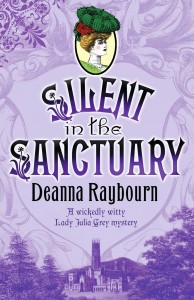 Deanna: Aaah, those are things I actually can’t tease. Again, there are a unique set of challenges that come with writing a series, and one of them is tension, making sure that that relationship stays sharp, and stays sparky. But then there’s also the tension of, what am I going to do later on. We’ve got the big life questions – we’ve got family members coming in and coming out, the question of what are we going to do as parents, are they going to have children, are they going to settle down, are they going to travel a lot. There are things I don’t even know the answers to. I know more than I’m telling you, but… As for the definitive, exactly how we’re going to end up – I like to leave things a little bit fluid, because I do structure before I write, but I also believe in the power of serendipity. And I think that when you have characters in interesting circumstances, every once in a while, your subconscious comes up with ideas that surprise you. And I like to ride the surprises, because they take me to really interesting places. So I know what I think I’m going to do…
Deanna: Aaah, those are things I actually can’t tease. Again, there are a unique set of challenges that come with writing a series, and one of them is tension, making sure that that relationship stays sharp, and stays sparky. But then there’s also the tension of, what am I going to do later on. We’ve got the big life questions – we’ve got family members coming in and coming out, the question of what are we going to do as parents, are they going to have children, are they going to settle down, are they going to travel a lot. There are things I don’t even know the answers to. I know more than I’m telling you, but… As for the definitive, exactly how we’re going to end up – I like to leave things a little bit fluid, because I do structure before I write, but I also believe in the power of serendipity. And I think that when you have characters in interesting circumstances, every once in a while, your subconscious comes up with ideas that surprise you. And I like to ride the surprises, because they take me to really interesting places. So I know what I think I’m going to do…
Byrt: But no guarantees. You mentioned Africa – do you have any other locations you’ve kind of played around with? Will we see America, maybe, someday? Or…
Deanna: That’s one of those things that I would love to do, because I think it has a lot of potential for an interesting setting – but, you know, I have a lot of ideas floating around in my head.
Byrt: Australia, perhaps?
Deanna: I have cousins – I could do that…
Byrt: Do you get pressure from your publisher to keep it London based, or keep it feeling very British?
Deanna: I wouldn’t say pressure at all. There are times when we sit around and my editor and I will brainstorm and say, what do you think about this? Should we open it up and take them someplace new, or should we bring them back home? And so that’s what we’ve done with every book in the series – well, the first one was already written, the second one was planned, and the third one I had an idea, so those three settings were already pretty much in place. So my editor and I had great conversations about Dark Road to Darjeeling and The Dark Enquiry, about where they should go from here, and what we wanted to do – so, again, it’s kind of fluid.
Byrt: Now to the people who look at the Harlequin brand and kind of turn up their noses – what would you say to them, how would you convince them to give your book a try?
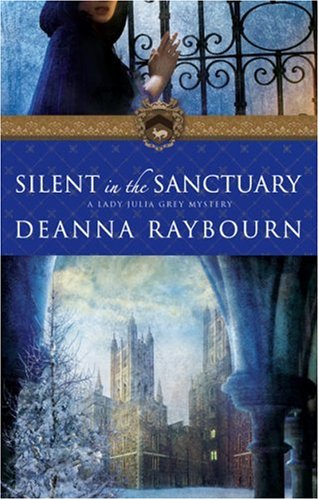 Deanna: It’s narrow minded, to look at anything and think: oh, I’m not going to read THAT, just because. Honestly, Harlequin is…the biggest publisher in the world? I mean, they’ve got offices in India, in Turkey – they’re everywhere. Even the idea of looking down on Romance, it’s sad. Romance is, besides birth and death, it’s the one universal that we have, it crosses all cultural boundaries. I think people turn their noses up at it because it’s viewed as “Women’s” – it has to do with women, it has to do with emotion, it’s not “serious.” And let me tell you something – it can be deadly serious at times; they deal with a lot of very important issues. And you know, some books are there just because they want to take you on a fun romp, and some of them are there because they want to talk about something really, really relevant. There are all kinds of issues, and if there’s an issue or situation that you’re processing in your life, I guarantee there is a romance writer who has written a book about it, and at some point there has been a character who has dealt with what you’re dealing with. And I specifically write for the MIRA imprint, which is the women’s literary fiction line of Harlequin, and we write stuff that tends to cross genres. There’s a lot of suspense that MIRA publishes – there are books that I can’t read, they’re so scary. I already look behind the shower curtain, so I’m terified of those books, they’re so, on the edge of your seat. And then they publish books like mine, that cross over into mystery. It seems to be the one imprint for my publisher that really encompasses a wide range of things. It gives a home to books that might not be that easy to pigeonhole.
Deanna: It’s narrow minded, to look at anything and think: oh, I’m not going to read THAT, just because. Honestly, Harlequin is…the biggest publisher in the world? I mean, they’ve got offices in India, in Turkey – they’re everywhere. Even the idea of looking down on Romance, it’s sad. Romance is, besides birth and death, it’s the one universal that we have, it crosses all cultural boundaries. I think people turn their noses up at it because it’s viewed as “Women’s” – it has to do with women, it has to do with emotion, it’s not “serious.” And let me tell you something – it can be deadly serious at times; they deal with a lot of very important issues. And you know, some books are there just because they want to take you on a fun romp, and some of them are there because they want to talk about something really, really relevant. There are all kinds of issues, and if there’s an issue or situation that you’re processing in your life, I guarantee there is a romance writer who has written a book about it, and at some point there has been a character who has dealt with what you’re dealing with. And I specifically write for the MIRA imprint, which is the women’s literary fiction line of Harlequin, and we write stuff that tends to cross genres. There’s a lot of suspense that MIRA publishes – there are books that I can’t read, they’re so scary. I already look behind the shower curtain, so I’m terified of those books, they’re so, on the edge of your seat. And then they publish books like mine, that cross over into mystery. It seems to be the one imprint for my publisher that really encompasses a wide range of things. It gives a home to books that might not be that easy to pigeonhole.
Byrt: Last question: for those long interminable waits between books, what are some good places to go – maybe British TV shows to watch, or British movies – things we can use to get a fix of Lady Julia style fun while we’re waiting for the next book.
Deanna: Like I said, I cross pollinate a lot (the readers), with Tasha Alexander and Lauren Willig. Elizabeth Loupas is another one to watch, she had a great book come out this last year. If you’re looking for TV shows, I am absolutely smitten with Masterpiece – I love the fact that they’ve divided it up it into Mystery and Classic and Contemporary – and they’ve done amazing things. Just in the last year, they had Sherlock, and Dowton Abbey, and South Riding – which I finally got a chance to watch last week. It broke my heart in all the best ways. Phenomenal. They’re doing incredible work. And every once in a while BBC America will throw out something – they’ve gotten into a lot of police procedurals lately, and like I said I’m a huge chicken. I like Gothic horror. I don’t like anything too real, in that respect. But there’s always going to be stuff out there for the Anglophile, thank goodness.
Thanks again to Deanna for taking the time from her hectic BEA schedule!
For more on Deanna and her books, check out her website here.
And our review of Silent in the Grave is here.
